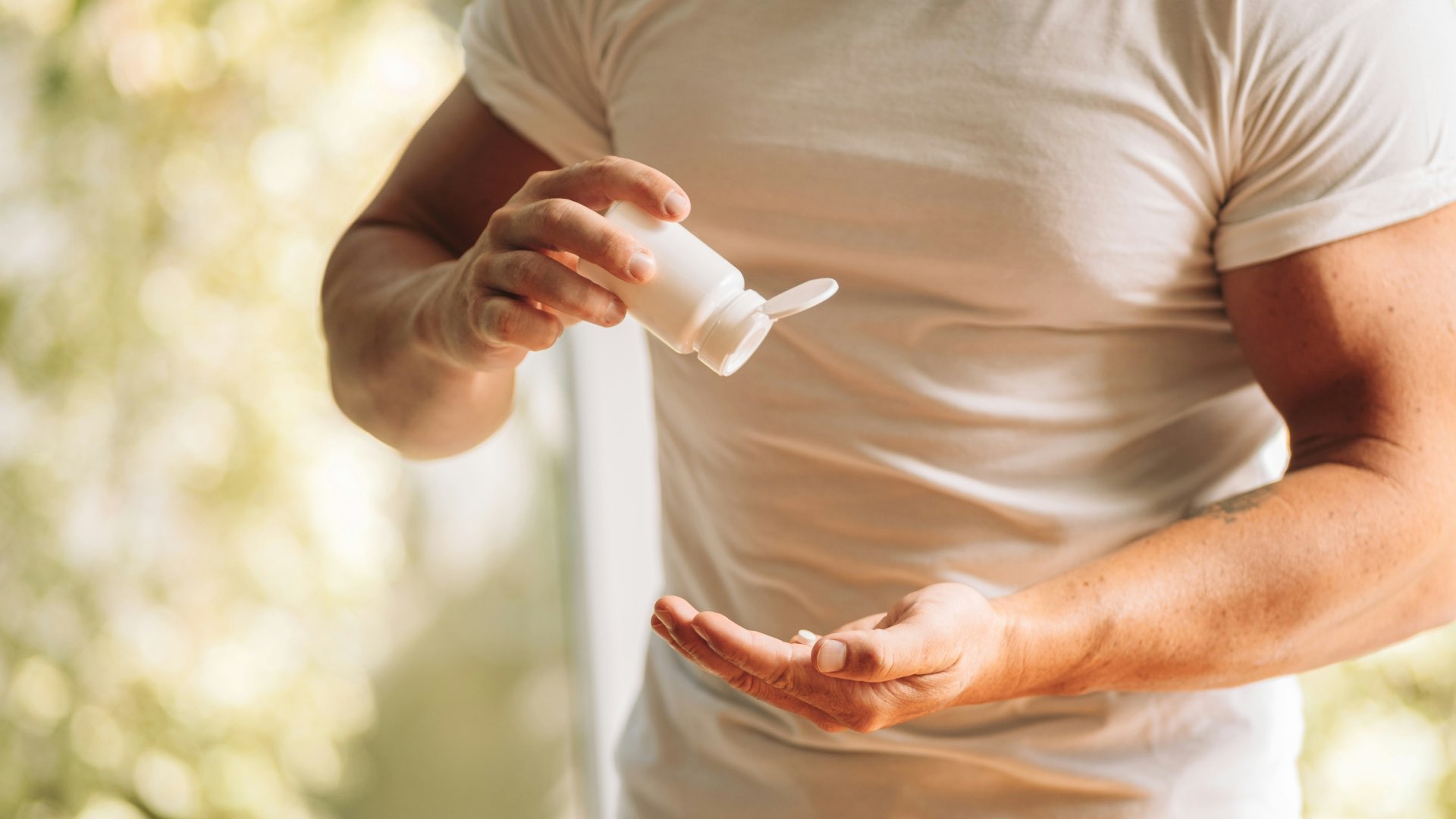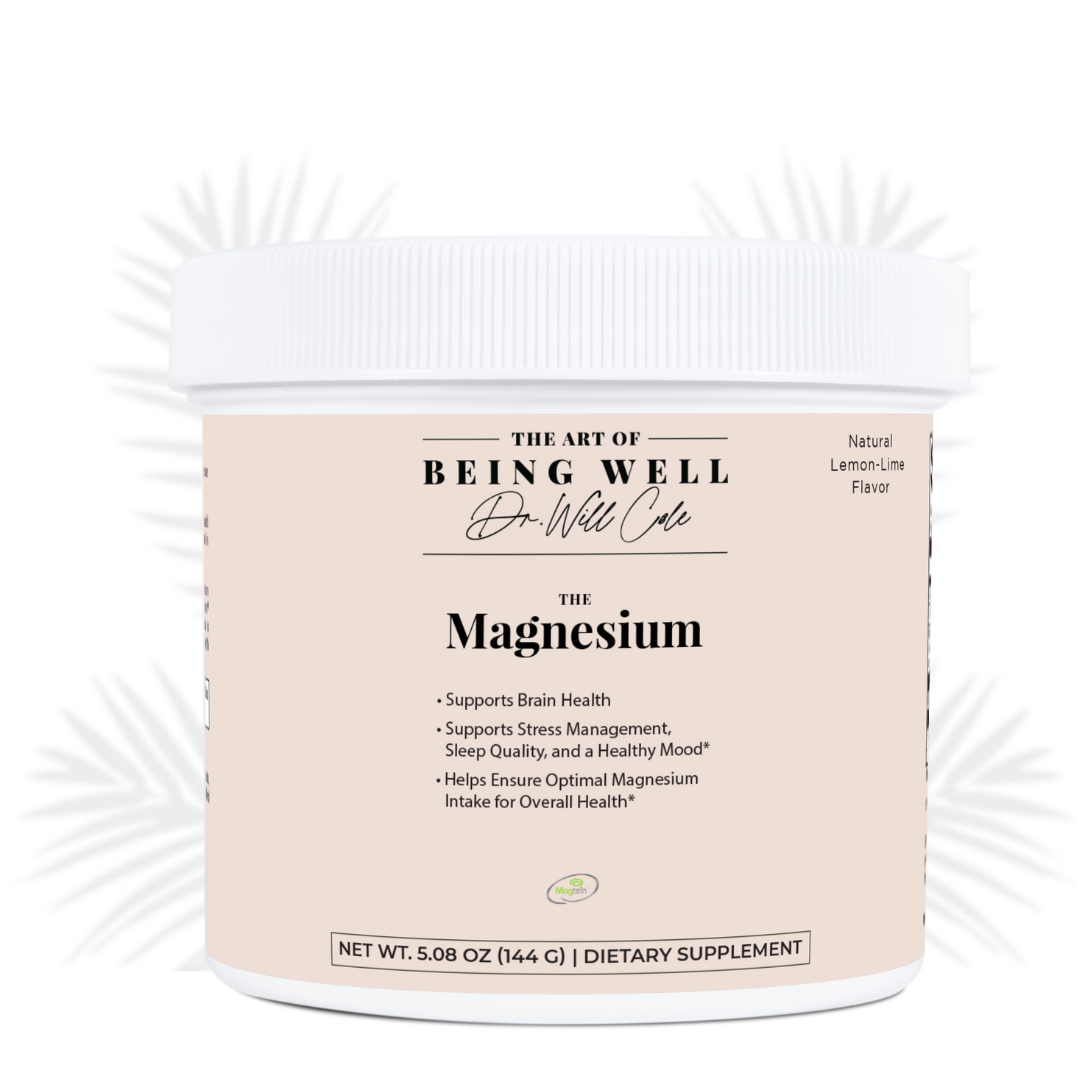The Top Vitamins and Supplements For Muscle Cramps + Spasms

If you've ever experienced the discomfort of muscle cramps and spasms, you know how much they can disrupt your daily life. As a functional medicine expert, my job is to show you precisely what’s behind these uncomfortable cramps and offer solutions rather than just treating symptoms.
From the best vitamins to my favorite lifestyle habits, I created this guide to help you rid yourself of muscle cramps and spasms once and for all.
What Are Muscle Spasms?
Muscle spasms, more commonly referred to as muscle cramps, are involuntary contractions of one or more muscles in the body. These contractions can be sudden and intense, and some people can also experience discomfort or pain. Muscle spasms most often occur in the legs, feet, hands, arms, neck, and back.
Symptoms of muscle spasms or cramps include:
- Involuntary muscle contraction
- Pain
- Muscle hardening
- Visible twitching
- Limited range of motion
- Cramping sensation/discomfort
If you experience frequent or severe muscle spasms or have other concerning symptoms that accompany them, it's important to talk with your healthcare provider to get a proper evaluation and medical advice.
They can help you identify the root cause and recommend the best vitamins for cramps and spasms. Additionally, if you have other ongoing symptoms, they can rule out any other more serious conditions.
@drwillcole Have you heard of Reduced Exertion HIIT (REHIT)?? 💦 Explore this revolutionary approach used by @thecarolbike that is changing the cardio fitness landscape in this episode of The Art of Being Well podcast. 🚲 Listen to the full episode now to discover why cardio is essential, how improved fitness can enhance your quality of life and longevity, and how you can optimize your workout results in significantly less time. Check it out at the link in the bio or search The Art of Being Well anywhere you get your podcasts. #taobw #drwillcole #carolbike #fitnessbikes #bestfitnessbikes #bikeclasses #functionalmedicine #healthpodcast #bikemonth ♬ original sound - Dr. Will Cole
The Best Supplements For Muscle Relief
Specific vitamins and supplements have been shown to help relieve muscle cramps and spasms, especially in the case of deficiencies. Here’s a breakdown of the best nutrients to consider adding to your regimen for muscle health:
Potassium
Potassium is an electrolyte that helps regulate muscle and nerve function. Low potassium levels are linked to muscle spasms. Potassium-rich foods include bananas, oranges, spinach, and sweet potatoes.
However, one banana only contains 420mg of your daily 4,700mg potassium requirement, so I recommend adding a daily supplement to overcome severe deficiencies.
Magnesium
Magnesium is responsible for proper neuromuscular transmission and muscle contraction. Close to 90% of the population is deficient in this nutrient. (1) Foods like nuts, seeds, and leafy green vegetables are good sources of magnesium, but supplements may be required for significant deficiencies.
Not all magnesium supplements are created equally in terms of bioavailability. I formulated The Magnesium to give maximum absorption when treating magnesium deficiency.
B Vitamins
Vitamin B6 (pyridoxine), vitamin B12, and vitamin B1 (thiamine) are important for nerve function. B complex supplements (like my supplement B-Better) can be beneficial for relieving muscle spasms and cramps. (2)
Foods high in B vitamins include whole grains, organ meats, eggs, and dairy products. Vitamin B complex supplements are particularly effective for improving blood flow and blood cell health and supporting overall muscle health.
CoQ10
Coenzyme Q10 is an antioxidant that plays a role in cellular energy production. Some studies suggest that CoQ10 supplements may help reduce muscle cramps and improve muscle function. (3) Foods like fish, meat, and whole grains can also provide CoQ10.
The CoQ10 was specially formulated to fight off free radicals and boost your lymphatic flow with the most bioavailable forms of nutrients.
Calcium
Calcium is important for muscle contraction, making it one of the best supplements for muscle cramps. (4) Dairy products, leafy greens, and fortified foods are good sources of calcium.
Vitamin D
Vitamin D plays an important role in muscle function and calcium absorption. (5)
Vitamin D deficiency can lead to muscle weakness and an increased risk of muscle cramps. Sun exposure and foods like fatty fish, fortified dairy products, and supplements can help maintain adequate levels.
LISTEN: Longevity Secrets, Hydration Hacks, Brain Optimization + Adaptogens with Chervin Jafarieh
Vitamin E
Vitamin E is an antioxidant that helps repair damaged cells, including muscle cells. (6) It supports muscle recovery and can help alleviate cramps and spasms. Foods like nuts, seeds, and green leafy vegetables are rich in vitamin E.
Vitamin K2
Vitamin K2 helps with blood clotting and bone health, and some research suggests it may also help with nocturnal muscle cramps. (7) Foods like natto, grass-fed cheese, grass-fed beef, and egg yolks are high in vitamin K2.
What Causes Muscle Cramps + Spasms?
There are several lifestyle habits or underlying health conditions that may cause frequent muscle cramping, including:
- Overexercise
- Dehydration, particularly when your electrolyte levels are imbalanced (8)
- Not stretching enough before or after physical activity
- Chronic stress (which can also cause muscle weakness in general) (9)
- Nerve problems that cause muscle contractions linked to injuries, inflammation, or vitamin/mineral deficiencies (like in potassium, vitamin D, or B vitamins)
- Pregnancy (almost 50% of pregnant women experience this symptom!) (10)
- Medical conditions like muscular dystrophy, multiple sclerosis (MS), neurological conditions, and metabolic disorders like diabetes (usually, poor circulation in these conditions deprives muscles of oxygen and nutrients, leading to spasms)
- Certain medications that impact muscle function or electrolyte balance, such as antibiotics or diuretics (quinine is a medication often used for nocturnal leg cramps but may cause muscle discomfort as a side effect)
Read More: You Might Be Chronically Stressed: Here Are The 9 Signs To Look Out For
Bonus: Simple Strategies For Cramp Prevention
In addition to vitamins and dietary supplements, you can adopt several lifestyle changes to prevent muscle spasms. These strategies can help you maintain muscle health and avoid the discomfort of cramps:
- Stretch before exercise: Incorporate regular stretching into your daily exercise routine to maintain flexibility and reduce muscle tension.
- Stay hydrated: Drink water throughout the day to avoid dehydration. Consider adding an electrolyte supplement to your water.
- Get a massage: Regular massages can help relieve built-up muscle tension and reduce your risk of spasms.
- Manage your stress levels: Daily mindfulness practices like breathwork, meditation, or yoga can help alleviate stress.
Finding The Right Plan For You
Finding relief from muscle spasms goes beyond supplementation and includes a whole-body approach. By combining supplements and lifestyle changes, you can start to heal from the inside out.
If you are struggling with ongoing muscle spasms, it’s important to work with a qualified practitioner who can develop a plan of action unique to you.
In my telehealth functional medicine clinic, we help you uncover the root cause behind your symptoms and identify what healing tools you need to reclaim your health.
As one of the first functional medicine telehealth clinics in the world, we provide webcam health consultations for people around the globe.
View More At Our Store
Purchase personally curated supplements
and Dr. Will Cole’s books!

- Killilea, D. W., & Ames, B. N. (2008). Magnesium deficiency accelerates cellular senescence in cultured human fibroblasts. Proceedings of the National Academy of Sciences, 105(15), 5768-5773.
- Katzberg, H. D., Khan, A. H., & So, Y. T. (2010). Assessment: Symptomatic treatment for muscle cramps (an evidence-based review) Report of the Therapeutics and Technology Assessment Subcommittee of the American Academy of Neurology. Neurology, 74(8), 691-696.
- Taylor, B. A. (2018). Does coenzyme Q10 supplementation mitigate statin-associated muscle symptoms? Pharmacological and methodological considerations. American Journal of Cardiovascular Drugs, 18, 75-82.
- Szent-Györgyi, A. G. (1975). Calcium regulation of muscle contraction. Biophysical journal, 15(7), 707-723.
- Rejnmark, L. (2011). Effects of vitamin D on muscle function and performance: a review of evidence from randomized controlled trials. Therapeutic advances in chronic disease, 2(1), 25-37.
- Kim, M., Eo, H., Lim, J. G., Lim, H., & Lim, Y. (2022). Can low-dose of dietary vitamin e supplementation reduce exercise-induced muscle damage and oxidative stress? A meta-analysis of randomized controlled trials. Nutrients, 14(8), 1599.
- Li, Y., Zhu, R., Wang, L., & Tan, J. (2023). Effect of vitamin K2 in the treatment of nocturnal leg cramps in the older population: Study protocol of a randomized, double-blind, controlled trial. Frontiers in Nutrition, 10, 1119233.
- Jung, A. P., Bishop, P. A., Al-Nawwas, A., & Dale, R. B. (2005). Influence of hydration and electrolyte supplementation on incidence and time to onset of exercise-associated muscle cramps. Journal of Athletic Training, 40(2), 71.
- Patel, B. C. (2023). Eyelid Myokymia. In StatPearls [Internet]. StatPearls Publishing.
- Araújo, C. A. L. D., Lorena, S. B. D., Cavalcanti, G. C. D. S., Leão, G. L. D. S., Tenório, G. P., & Alves, J. G. B. (2020). Oral magnesium supplementation for leg cramps in pregnancy—An observational controlled trial. PLoS One, 15(1), e0227497.
The information on this website has not been evaluated by the Food & Drug Administration or any other medical body. We do not aim to diagnose, treat, cure or prevent any illness or disease. Information is shared for educational purposes only. You must consult your doctor before acting on any content on this website, especially if you are pregnant, nursing, taking medication, or have a medical condition.
Our content may include products that have been independently chosen and recommended by Dr. Will Cole and our editors. If you purchase something mentioned in this article, we may earn a small commission.

BY DR. WILL COLE
Dr. Will Cole, DNM, IFMCP, DC is a leading functional medicine expert who consults people around the globe, starting one of the first functional medicine telehealth centers in the world. Named one of the top 50 functional and integrative doctors in the nation, Dr. Will Cole provides a functional medicine approach for thyroid issues, autoimmune conditions, hormonal imbalances, digestive disorders, and brain problems. He is also the host of the popular The Art of Being Well podcast and the New York Times bestselling author of Intuitive Fasting, Ketotarian, Gut Feelings, and The Inflammation Spectrum.

Gut Feelings
Healing The Shame-Fueled Relationship
Between What You Eat And How You Feel

